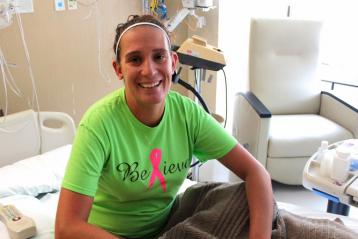Every day Stephanie starts it off with breathing treatments and Vest chest therapy that lasts 30-45 minutes. Followed by taking around 18-20 oral medications, a few in the afternoon and 8-10 before bed. Prior to eating every meal or snack oral pancreatic enzymes help digest her food because CF not only effects the lungs. Then before even thinking about going to bed another 30-45 minute session of treatments has to be done.
Having both lungs collapse at once, to using oxygen 24-hours-a-day and even having her name added to a list for double lung transplant. She has had several surgeries including two cesarean sections, one chest tube for a short period due to the pneumothorax, her gallbladder and appendix removed and a central port line placed.
At times, her lung function is down very low and it’s harder to bring it back to her normal of 33-35%. When that happens, typically she will spend two weeks at Nebraska Medicine – Nebraska Medical Center. During that time the treatment consists of respiratory chest percussion treatment (CPT) four times a day, several nebulized medications and IV antibiotics. All combined causes Stephanie to loosen and cough up the mucus that clogs the lungs.
The test that is performed to measure lung function is called pulmonary function test (PFT). The FEV1 is the number (or percentage) that counts. It’s used for assessing airflow limitation and normal range should be between 80-120 percent. When hospitalized PFT’s are done twice a week to show that the percentage is increasing and not decreasing.
The journey of being evaluated for the lung transplant list is a weird one. After giving birth to her son her pulmonary function decreased tremendously. It hovered around 23-24%. She was then referred to a hospital in Minneapolis, Minnesota for a lung transplant evaluation. Stephanie endured a long week of tests to determine eligibility and placement on the list with her family there by her side for support. After that she made the decision to start exercising regularly and it started at a pulmonary rehabilitation center. Then she enrolled in a membership at a gym. Exercising was the game changer and had a great effect on her lungs. PFT results proved it, numbers increased. Minnesota then changed her status to inactive on their transplant list which was awesome. Ultimately living with her lungs and not transplanted lungs is best.
About 4 years ago, after a routine check-up, the sputum (mixture of saliva and mucus) sample she gave grew a bacteria called B. cepacia. To healthy people, it causes little medical risk and can be fought off by the body. For those with cystic fibrosis, it can lead to more infections and worse. It devastated her. Numerous things we’re used trying to get rid of it, including oral and IV antibiotics. Nothing worked. Then to top things off, B. cepacia in lungs meant only 3-4 transplant centers in the US would even consider evaluation for a lung transplant. That is when the travels to Cleveland, Ohio and becoming a new pre-transplant patient of The Cleveland Clinic started.
Luckily, Stephanie has the best support system anyone could ask for. The annual Great Strides Cystic Fibrosis Foundation Walk in Omaha is very important to her. Each May rallying the friends, friends of friends, family, business sponsors and new supporters to participate. Team “Lungs for Steph” grows more each year. In 2014, approximately 110 registered walkers attended. Team t-shirts are usually designed and sold. Half the proceeds donated to the Cystic Fibrosis Foundation and the other half gets added to her transplant fund, set up and regulated by the Children’s Organ Transplant Association (COTA). If and when transplant is needed there are expenses that are not paid by insurance. Not only that but every time she goes to Cleveland there are travel expenses for her and a patient caregiver.
If staying active to lead a somewhat normal lifestyle with lower limitation is needed then she’s doing it. Keep fighting the fight, stay strong and be a positive mentor for other CF’rs are what make it easier.


